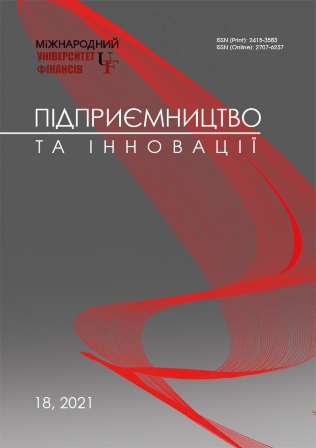LOGISTIC SUPPORT FOR THE KNOWLEDGE TRANSFER FROM THE FIELD OF SCIENCE TO THE SECTOR OF SMALL AND MEDIUM BUSINESS
Abstract
The main purpose of technology transfer is the formation of the knowledge economy and its integration into the world economy on the new principles of innovation implementation. The purpose of the article is to characterize the means of logistical support of the process of knowledge transfer from science to industry, the SME sector. Analysis of the activities of SMEs showed that they are not active in all areas of management, and the vast majority of respondents do not have and do not form a market strategy. Small and medium-sized enterprises focus on short-term planning - maximizing the use of resources and investing in increasing production capacity. On the other hand, SMEs are not interested in introducing significantly new, innovative products, but only improve existing ones. Among the factors that stimulate the activities of SMEs, the most important are: organization and management, innovation and customer satisfaction. It has been established that the development of a knowledge-based economy requires new approaches to knowledge and to participants in all processes related to the creation, accumulation and dissemination of knowledge. Knowledge transfer is a bridge between those who create it and those who need it. The model of knowledge transfer from the sphere of science to the sphere of small and medium business with elements of logistic flows is formed. It is substantiated that the transfer of knowledge from the field of science to the SME sector, which is supported by logistics activities, leads to the launch of the innovation process. The efficiency of use in the relationship between science and industry, including the small and medium business sector, the strategy of Efficient Consumer Response. The logistical and marketing aspects of the transfer of knowledge on the strategy of Efficient Consumer Response (ECR) include the following activities: constant emphasis on providing the recipient with the best product; building relations between science and industry on a win / win model; timely provision of information; knowledge transferred from the field of science to the field of industry is used to create added value; the effectiveness of the knowledge transfer system is monitored, analyzed and evaluated by both parties involved in the knowledge transfer process.
References
Про державне регулювання діяльності у сфері трансферу технологій : Закон України від 14.09.2006 № 143-V / Верховна Рада України. URL: https://zakon.rada.gov.ua/laws/show/143-16#Text.
Баб’як М.М. Розвиток малого і середнього підприємництва у регіоні. Актуальні проблеми економіки. 2004. № 12. C. 77–83.
Lundvall, B.-Å and Johnson, B. The learning economy. Journal of Industry Studies. 1994. Vol. 1. № 2. Р. 23–42.
Twiss B.C. Managing Technological Innovation, Pitman Publishing. London, 1994.
Alvarado U.Y., Kotzab H. Supply Chain Management: The Integration of Logistics in Marketing. Industrial Marketing Management. 2001. № 30. Р. 183–198.
On state regulation of activities in the field of technology transfer: Law of Ukraine of 14.09.2006 No 143-V.Verkhovna Rada of Ukraine. Available at: https://zakon.rada.gov.ua/laws/show/143-16#Text.
Babiak M.M. Rozvytok maloho i serednoho pidpryiemnytstva u rehioni. [Development of small and medium business in the region]. Aktualni problemy ekonomiky. 2004. № 12. C. 77-83.
Lundvall, B.-Å., Johnson, B. (1994). The learning economy. Journal of Industry Studies, Vol. 1, No. 2. pp. 23-42.
Twiss B.C. (1994). Managing Technological Innovation, Pitman Publishing. London.
Alvarado U.Y., Kotzab H. (2001). Supply Chain Management: The Integration of Logistics in Marketing. Industrial Marketing Management 30, 183–198. Elsevier Science Inc.



